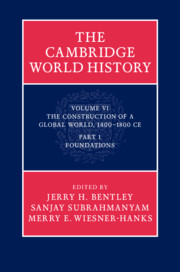Book contents
- The Cambridge World HistoryVOLUME VI
- The Cambridge World History
- The Cambridge World History
- Copyright page
- Dedication
- Contents
- Figures
- Maps
- Tables
- Contributors
- Preface
- 1 Introduction
- Part One Global matrices
- Part Two Macro-regions
- 7 Eurasia after the Mongols
- 8 Continuity and change in the Indian Ocean basin
- 9 The Americas in the age of indigenous empires
- 10 Africa in world history, 1400 to 1800
- Part Three Large-scale political formations
- Part Four Crossroads regions
- Part Five Overview
- Index
- References
7 - Eurasia after the Mongols
from Part Two - Macro-regions
Published online by Cambridge University Press: 05 May 2015
- The Cambridge World HistoryVOLUME VI
- The Cambridge World History
- The Cambridge World History
- Copyright page
- Dedication
- Contents
- Figures
- Maps
- Tables
- Contributors
- Preface
- 1 Introduction
- Part One Global matrices
- Part Two Macro-regions
- 7 Eurasia after the Mongols
- 8 Continuity and change in the Indian Ocean basin
- 9 The Americas in the age of indigenous empires
- 10 Africa in world history, 1400 to 1800
- Part Three Large-scale political formations
- Part Four Crossroads regions
- Part Five Overview
- Index
- References
Summary
- Type
- Chapter
- Information
- The Cambridge World History , pp. 159 - 181Publisher: Cambridge University PressPrint publication year: 2015



